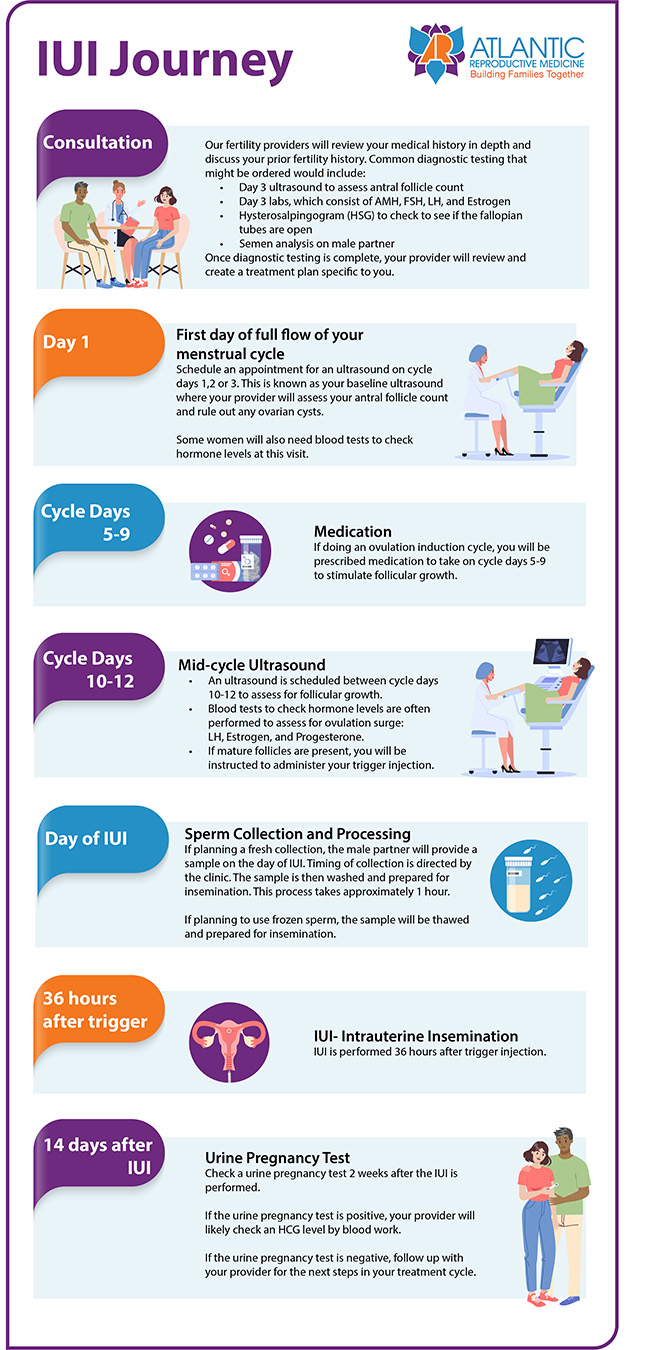Intrauterine insemination (IUI), also known as artificial insemination, is a fertility treatment that involves placing sperm directly into the uterus by use of a catheter to increase the chances of fertilization and pregnancy.
IUI is a relatively simple procedure that can result in pregnancy success for couples experiencing infertility. The objective of IUI is to increase the number of motile sperm that reach an egg to facilitate fertilization. It is usually the first-line approach for couples seeking assisted reproductive treatment. Unlike IVF, IUI does not require the collection of eggs from the ovaries or fertilization outside of the body.
Who Can Benefit from IUI?
IUI is often considered by fertility specialists as the first line of treatment for infertility, mild male factor infertility, or mild endometriosis. Intrauterine insemination can help a couple if:
- A female has problems with ovulating and has not been able to conceive using ovulation-inducing medication timed with home intercourse. Fertility medications that increase the number of eggs during ovulation can help achieve pregnancy with IUI.
- A male partner has frozen stored sperm
- A male partner has difficulty ejaculating.
- A male partner’s sperm analysis indicates minor abnormalities. Sperm washing during IUI treatment can select strong sperm.
- Donor sperm is being used to get pregnant.
How is the IUI procedure performed?

IUI treatment is relatively simple and painless:
- A patient’s ovulation is monitored. This is usually done with blood tests and ultrasounds.
- IUI is done on an outpatient basis on the day of ovulation.
- The patient’s partner or donor provides a semen sample. The semen sample is collected into a sterile container either at the clinic or at home.
- The andrology laboratory processes the semen sample to remove any debris or unhealthy sperm, resulting in a final sample with highly motile sperm.
- The selected sperm is placed into a catheter. The catheter is a thin, flexible tube that is inserted in the uterus through the cervix.
- The sperm is then injected into the uterus. This process is usually painless and only takes a few minutes.
- The patient rests for a short time after the procedure and is then able to resume normal daily activities.

IUI Success Rates and Factors
For IUI to be successful, a semen sample has to have enough sperm to get through the washing process. The chosen sperm will bypass the cervical mucus barrier, which can sometimes be a factor in infertility, but they will still have to swim up the fallopian tube.
On the female side, the egg will need to make it from the ovary into the fallopian tube successfully.
The sperm needs to meet the egg in the fallopian tube, where fertilization will occur. The fertilized egg then needs to travel down to the uterus successfully.
Clinical data indicates 1 in 4 couples will get pregnant with up to three inseminations. That’s about a 25% success rate with up to three inseminations.
The success rate of IUI depends on several factors:
- Female factors such as age, ovarian function, overall health, and any conditions such as fallopian tube blockage, endometriosis, uterine abnormalities, or other related factors.
- Male factors such as sperm parameters. A higher number of progressively motile sperm favors the chances of pregnancy.
- The timing of insemination.
Successful Insemination with IUI: Factors and Timing
To achieve a successful insemination, it is important to time the IUI accurately—when the egg has ovulated into the fallopian tubes. IUI is done either with a natural cycle or an ovarian-stimulated cycle.
In a natural cycle, the timing of ovulation is predicted using an ovulation predictor kit that measures the LH surge. If the test returns positive, the insemination is done the next day.
Alternatively, a hCG trigger for ovulation can be used. In this stimulated cycle, medication such as clomiphene citrate, letrozole, or FSH is administered to promote follicular growth. When the follicles grow to a certain size, a hCG injection trigger is given to induce maturation and ovulation. The IUI is then performed 36 hours after the hCG trigger is administered.

IUI Success Tips for Women and Men Before an IUI Treatment
While the success rates of IUI vary depending on individual factors, there are several things you can do leading up to an IUI treatment to increase your chances of a successful pregnancy:
- Have regular checkups with your doctor to monitor your overall health and discuss any health concerns you may have. It is important to make sure that you are in good overall health before starting IUI.
- Avoid smoking and excessive alcohol consumption. Smoking and excessive alcohol consumption can damage sperm and eggs, and can reduce your chances of success with IUI.
- Maintain a healthy weight. Being overweight or obese can affect ovulation and sperm production, and can reduce your chances of success with IUI.
- Eat a healthy diet. Eating a healthy diet can help to improve your overall health and fertility. Aim to eat plenty of fruits, vegetables, and whole grains.
- Get regular exercise. Moderate exercise can help to improve your overall health and fertility. Avoid strenuous exercise, especially during your menstrual cycle.
- Manage stress. Stress can affect your hormones and can reduce your chances of success with IUI. Find healthy ways to manage stress, such as yoga, meditation, or spending time in nature.
- Choose a highly reputable fertility clinic and fertility specialist. It is important to do your research and choose a clinic and specialist who is reputable and has a good track record of success. A fertility specialist will be able to assess your individual situation, unique health history, unique fertility challenges and goals, and recommend the best course of treatment for you.
- Be prepared to ask questions. Don’t be afraid to ask your doctor any questions you have about IUI. The more informed you are, the better equipped you will be to make decisions about your treatment.
- For the female patient specifically: follow your specialist’s instructions closely. Your doctor will give you specific instructions on how to prepare for your IUI, such as when to take medication and when to abstain from sexual intercourse. Be sure to follow these instructions carefully to increase your chances of success.
- For the male patient specifically: follow your specialist’s instructions for producing your semen sample carefully. This will increase your chances of providing healthy sperm.
What to Do After IUI to Increase Chances of Pregnancy

- Rest. Getting plenty of rest can help improve your overall health and fertility. Avoid caffeine and alcohol, and get 7-8 hours of sleep per night.
- Test for pregnancy 14 days after your IUI. This is when you are most likely to get a positive pregnancy test.
- Continue to follow your fertility specialist’s instructions. Your doctor will continue to monitor your progress after your IUI treatment. Be sure to follow their instructions and keep your regularly scheduled appointments.
- Be patient. IUI can take time to be successful. Don’t get discouraged if you don’t get pregnant the first time. Many couples need to try IUI several times before they become pregnant.
- Relax. The good news about an IUI procedure is that there are no restrictions as to what you can or cannot do after the treatment. You can have intercourse, exercise, and just about your daily routines.
What can a Couple do if IUI is Not Successful
If a couple is not pregnant after three inseminations, the reason may include:
- The sperm and egg are not finding each other, or
- The eggs and sperm are not interacting appropriately to achieve a fertilized embryo, or
- The fertilized embryo is not able to get to the uterus to make implantation.
If a pregnancy does not occur, a fertility specialist can explore other fertility treatments such as INVOcell or IVF (in vitro fertilization).
You can learn more about the differences between IUI and IVF in this IUI vs. IVF blog or from the Society for Assisted Reproductive Technology.
If you have questions about IUI or other fertility treatments, Atlantic Reproductive Medicine in Raleigh, NC is here to provide the highest level of personalized fertility care. Contact us to schedule a preconception counseling appointment with one of our experts.

